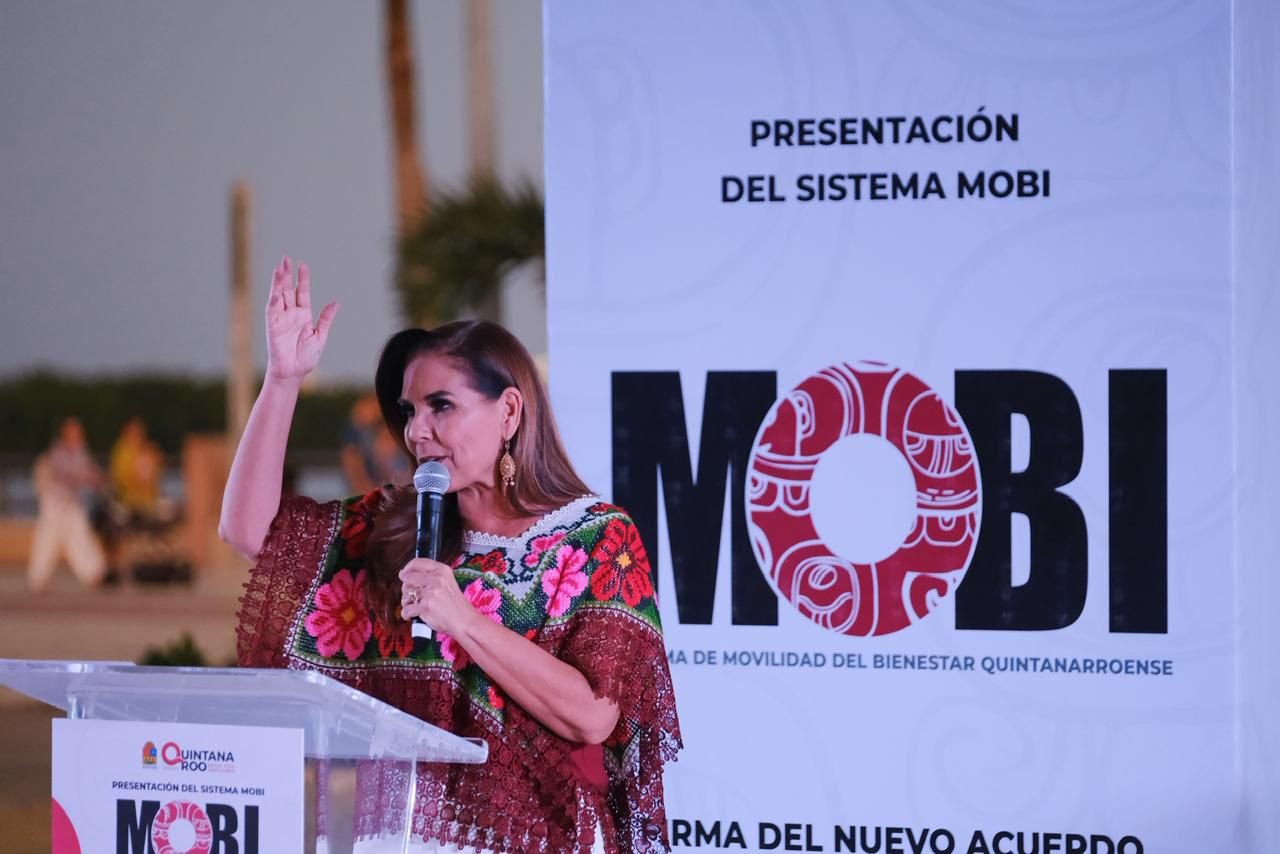Cancún, Mexico — Governor Mara Lezama Espinosa has presented the Sistema de Movilidad del Bienestar Quintanarroense MOBI (Quintana Roo Well-Being Mobility System MOBI), a profound and historic change intended to replace a decades-old model and improve the lives of Quintana Roo residents. The announcement was made in the presence of concession holders, transport workers, and unions who joined a New Agreement for the Modernization and Security of Public Transportation in Quintana Roo, which includes updated fares.
The new MOBI system responds to a deeply felt public demand, reflected in the voices of more than 25,000 people—including students, working mothers, people with disabilities, senior citizens, and workers from various productive sectors—gathered through citizen consultations conducted by the Instituto de Movilidad de Quintana Roo (IMOVEQROO).
“Today we take a historic step, a profound change. A change that is born from listening, from looking at each other face-to-face, from recognizing our reality and daring to transform it… transforming it with responsibility because in Quintana Roo, getting around must cease to be a privilege: because mobility is a daily necessity, one that defines opportunities, emotions, needs, and schedules… it defines the very life of millions of people,” expressed Governor Mara Lezama during a ceremony held at the Malecón Tajamar.
With the MOBI system, a social mobility policy, thousands of residents will have access to modern and dignified units, fair fares with digital payment, organized routes and reliable schedules, and total transparency through a Single File system, all designed to facilitate and transform the lives of Quintana Roo families.
In its first stage (2025–2027), MOBI will begin with an integrated network of buses in Chetumal, Cancún, Isla Mujeres, and Playa del Carmen, directly impacting 1,501,637 inhabitants, explained the head of IMOVEQROO, Rafael Hernández Kotasek.
To guarantee security and prevent corruption, Governor Mara Lezama announced that Quintana Roo will be the first state in the country to eliminate the Transit Officer role, replacing it with Mobility Agents—professional, trained men and women who operate without direct contact to issue sanctions and without the opportunity to negotiate.
This will be complemented by the Radar Seguro program, technology that will regulate speed without human interaction, thereby reducing corruption by removing the authority to issue fines previously held by Transit officers, reducing risks and saving lives.
“We cannot continue bearing the stigma of having the most corrupt transit police in the country, where 81% of people feel distrust and are tired of having to negotiate in the streets… tired of extortion and abuses that hurt the dignity of everyone,” stated the Governor.
Mara Lezama emphasized that these are the reasons “why we assume with seriousness and vision the responsibility of transforming this story… not with whims, not with improvisation, but with profound, technical, and human planning, to achieve a change that truly serves.”
The head of the Executive Branch reiterated that this System was built with and from the voices of Quintana Roo residents, based on technical studies that leave no room for improvisation, combining technology, order, and honesty, so that every person can travel without fear, without corruption, and with a transportation system that serves them.
Governor Mara Lezama told the people of Quintana Roo that MOBI has two missions: to finally resolve the historical debt of public transportation that for years complicated the lives of thousands of families, and to guarantee security, order, and transparency, leaving behind a model of corruption that hurt entire generations.
She added that in the coming days she will send a series of initiatives to the State Congress to provide a legal foundation for this new mobility model, ensuring that the rules, transparency, and accountability are maintained today and in the years to come.
This follows the signing of the New Agreement for the Modernization and Security of Public Transportation with concession holders, unions, and operators, which includes fleet renewal, speed controls, mandatory training, dignified service, and social fares. Furthermore, it recognizes transport workers as essential allies and citizens as the reason for every decision.
Mara Lezama concluded that MOBI is more than a mobility system; it is an act of social justice, the definitive end of a corrupt model, and the beginning of a modern, humane, and transparent mobility system.
“Today Quintana Roo changes the way it moves… and with that, it changes its way of living. The most profound changes require profound and responsible planning… and we have achieved it. MOBI has arrived, and it has arrived to improve our quality of life, it has arrived to bring justice, it has arrived for the well-being of all… Because it's not just about moving… it's about moving forward together,” the Governor of Quintana Roo said finally.
The municipal president of Benito Juárez, Ana Paty Peralta de la Peña, highlighted that this System brings an important change for the city. “Today we advance towards the future of mobility,” she stated.
Joining Mara Lezama at the head table were the honorary president of the Sistema DIF Quintana Roo, Verónica Lezama Espinosa; the municipal presidents Ana Paty Peralta de la Peña, of Benito Juárez; Yensunni Martínez Hernández, of Othón P. Blanco; Estefanía Mercado Asencio, of Playa del Carmen; Atenea Gómez Ricalde, of Isla Mujeres; magistrate Heyden Cebada Rivas, president of the Tribunal Superior de Justicia; Carlos Felipe Fuentes del Río, Consejo Jurídico; Ian Carlos Guadarrama Hernández, an Industrial Engineering student from the Facultad de Estudios Superiores de Aragón of the UNAM; and Arath de Jesús Martínez Guillén, a Financial Engineering student from the UPQROO.
Also in attendance were deputies Alberto Batún and Renán Sánchez Tajonar; the head of the Office of the Governor, Eric Arcila Arjona; the secretary of Women, Esther Burgos Jiménez; and the secretary of the Benito Juárez City Council, Pablo Gutiérrez Fernández.
Discover more from Riviera Maya News & Events
Subscribe to get the latest posts sent to your email.
